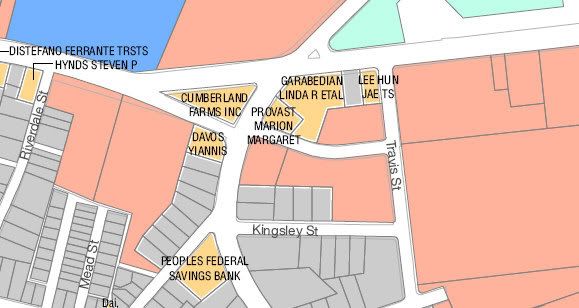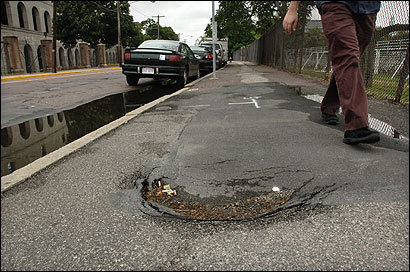A street of broken vows runs in Allston
Harvard slips on '97 improvement plan
By Marcella Bombardieri, Globe Staff | July 12, 2007
The asphalt sidewalk is marred by hazardous ditches and the occasional clump of weeds. The chain - link fence around the soccer field is a rusted, patched-up eyesore. Trees are sparse.
Welcome to the frontier of Harvard University's campus, North Harvard Street in Allston. A decade ago, Harvard pledged to replace the asphalt and fence and plant up to 52 trees here.
It never did.
The university had official reprieve from the city for many years and says it had good reasons to delay. Neighborhood activists never made much of a fuss about it.
Still, as Harvard prepares sweeping plans to remake this part of Allston over the next generation, some residents fear that the university's failure to take up one small beautification project for a decade represents a broader indifference to the community and to its own commitments.
"Is this a cautionary tale as we go forward?" asked Jeff Bryan, an Allston resident who has been active in neighborhood planning. "As we go forward with the commitments that are made today, will they slip through the cracks, as well?"
A Harvard official said that because the university's plans for Allston became more ambitious after that 1997 promise, Harvard envisions bigger, better changes to North Harvard Street. Harvard is now planning a 50-year expansion into Allston, expected to cost several billion dollars, with a science complex, arts facilities, student housing, and new homes for the schools of education and public health.
"We have never lost sight of the commitment to improve North Harvard Street," said Kevin McCluskey, Harvard's director of community relations, reading from a statement. He added that after years of planning with the community and city, there is a shared vision for "a much greater transformation and investment."
Recently, Harvard has talked about adding a two-way bike lane and a dedicated lane for a bus or shuttle ferrying passengers between Allston and Harvard Square. Nothing has been decided, and it is not clear when those changes would take place.
By the city's judgment, Harvard is one year late, not 10, said Susan Elsbree, spokeswoman for the Boston Redevelopment Authority.
A 2002 agreement between Harvard and the city noted that work on North Harvard Street had been delayed, pending wide-ranging neighborhood planning. Harvard agreed to carry out the improvements by July 1, 2006.
"We expect [the improvements] to be done immediately," Elsbree said last week. In a statement, the BRA added that Harvard has committed to far more extensive improvements of public space than those discussed in 1997.
McCluskey said Harvard would "take a much closer look" at short-term improvements on North Harvard Street. He would not directly address why it would not have been worthwhile to put in a better sidewalk or replace the rusty fence for the benefit of people who used the street over the last five to 10 years.
Instead, he provided a timeline of Harvard's collaborative work with the Allston community and a detailed description of recent plans to spruce up vacant properties owned by Harvard in the area, which neighbors are looking forward to. Apparently as part of that effort, some trees were recently planted along one university property on North Harvard.
Residents say they are pleased that Harvard is considering bigger improvements to the street, but several said they could not understand why the university would not buy some good will in the meantime.
"Whether Harvard develops a property in 10 or 20 years, they should take care of it right now," said Paul Berkeley, president of the Allston Civic Association. "These are not big-ticket items. Harvard can afford a few trees."
The city of Boston requires universities to sign formal agreements, called institutional master plans, that lay out their development ideas and the good things they will do for the city to make up for the disruption they cause.
Harvard's 1997 master plan predated its sweeping vision for an entire new campus in Allston. It focused on smaller projects, including the Harvard Business School campus center, the Spangler Center, and a graduate student dorm, One Western Avenue.
Among the good works promised were improvements to Western Avenue and North Harvard Street, which sandwich the school. While the timetable was vague, the document left the impression that the work would be completed within about five years of the 1997 agreement.
Harvard carried out the changes to Western Avenue. A 7-foot chain-link fence between the business school parking lot and the sidewalk was replaced with a grassy berm. Today, two rows of maple and locust trees rustle in the wind.
But 1997 was also the year that Harvard revealed that it had secretly purchased 52 acres in Allston. That news led to much wider-ranging efforts -- on the part of the university, city, and neighbors to sketch out what the future campus will look like and how it will change the city.
Several residents said they were so overwhelmed by the scope of Harvard's expansion plans that they took their eyes off smaller issues. "It was caught up in that maelstrom of all kinds of things happening," said Ray Mellone, a resident who has for years chaired task forces examining Harvard's plans.
Still, seeing action sooner rather than later would only help Harvard with its grander plans, said Brent Whelan, another task force member. "Taking down that fence would be a delight to all of us," Whelan said. "There are a lot of smaller things that would make us feel we have a better relationship, but they don't seem to want to do any of them."


